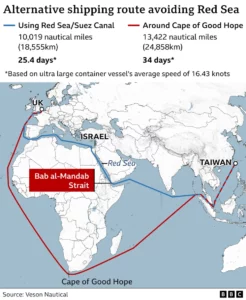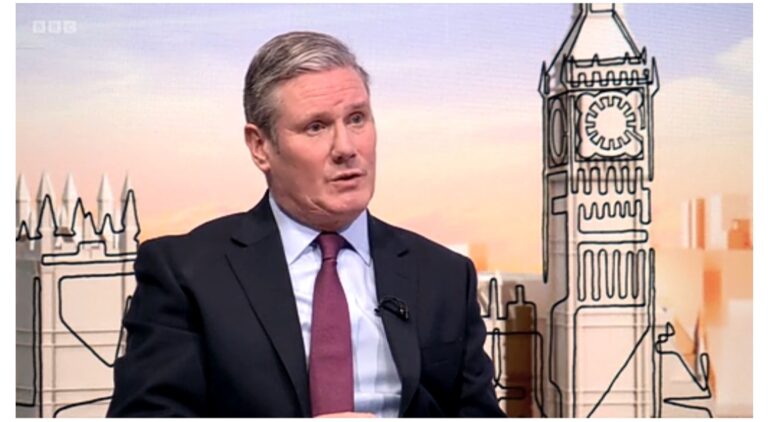NIN365 Desk, Kolkata : In a world pulsating with uncertainty and danger, where the global dashboard is ablaze with warning lights, a decisive moment unfolded as Lord Cameron, a prominent figure, revealed the imperative need for US-UK airstrikes. Months of relentless attacks on shipping demanded action, prompting a response that echoed through the intricate web of international relations. As the world grapples with ongoing conflicts in Ukraine, the Middle East, and Africa, the urgency of the situation has cast a spotlight on the precarious state of global security.
The Warning Lights Flash: A Perilous World Unveiled
Against the backdrop of escalating tensions, Lord Cameron painted a vivid picture of a world in turmoil during a conversation with the BBC. His cautionary words resonated with a stark reality – “hard to remember a more unstable, dangerous, and uncertain world.” The stage was set for a strategic move, propelled by the alarming escalation of attacks orchestrated by the Houthis, a political and military force entrenched in Yemen, including the capital.

A Delicate Dance of Diplomacy: Warnings to the Houthis
Lord Cameron stressed that the UK had issued numerous warnings to the Houthis, a group allied with Hamas and backed by Iran, Israel’s arch-enemy. The focal point of contention became the Houthi attacks on shipping in the Red Sea, a vital sea lane for global trade. With at least 27 attacks reported since mid-November, the stakes were high, forcing major shipping companies to reroute vessels, circumventing the Red Sea and navigating a longer route around southern Africa.
The Catalyst: US-UK Airstrikes Take Center Stage
As the situation reached a critical juncture, Lord Cameron revealed the necessity of US-UK airstrikes. Launched as a last resort, these strikes were described as “limited, proportionate, targeted, legal, but also necessary.” The echoes of conflict reverberated not only in the Middle East but also in the corridors of global power. The decision to bypass a political debate before the military action underscored concerns for operational security, setting the stage for a statement in Parliament.
Sir Keir Starmer’s Stance: A Balancing Act of Support and Caution
In the aftermath of the airstrikes, Sir Keir Starmer, the Labour leader, articulated his backing for the military operation, emphasizing that action had to be taken to protect shipping in the Red Sea. However, a nuanced approach emerged as he expressed the need for a critical evaluation of any future military endeavors in Yemen. “On its merit” became the benchmark for Labour’s support, emphasizing the importance of informed decision-making in matters of international consequence.
The Political Landscape: Criticisms and Support Echo Loudly
The political ramifications of the airstrikes reverberated across party lines. Prime Minister Rishi Sunak faced criticism for not consulting Parliament in advance, with opposition parties, including the Lib Dems, Plaid Cymru, and the SNP, denouncing the decision as “farcical.” The absence of parliamentary consultation ignited a debate on the balance between executive authority and democratic accountability in matters of military intervention.
Houthi Response: Defiance Amidst Adversity
In the aftermath of the airstrikes, the Houthis stood defiant. Dismissing any justification for the attacks, they vowed to continue targeting Israeli ships. The spokesperson for the group asserted their focus on ships linked to Israel or bound for Israeli ports, framing their actions within the context of a declared war against Israel. The potential repercussions loomed large, with warnings of targeted strikes against US and UK battleships using an arsenal of drones and cruise missiles if the attacks persisted.
A Broader Canvas: The Unfolding Yemeni Landscape
Zooming out to the broader canvas, the Houthi control over north Yemen, the capital Sanaa, and the Red Sea coastline became a focal point. Their alignment with the Iranian-led “axis of resistance” against Israel, the US, and the broader West provided context to their actions. The complex interplay of regional dynamics underscored the multifaceted challenges faced by nations navigating the intricate tapestry of Middle Eastern geopolitics.
The English Channel Tragedy: A Disturbing Parallel
As the geopolitical drama unfolded, another tragedy struck closer to home. The deaths of five individuals attempting to cross the English Channel overnight cast a shadow over the proceedings. Both Lord Cameron and Sir Keir Starmer expressed their sorrow, highlighting the need to curb illegal human trafficking. The pursuit of a deal with Rwanda to redirect asylum seekers to East Africa sparked debate, with Sir Keir labeling it a “gimmick” and emphasizing the importance of smashing criminal networks.
Lord Cameron’s Lobbying and Legacy: A Closer Look
Amidst the geopolitical turmoil, Lord Cameron faced scrutiny for his private lobbying efforts on behalf of disgraced financier Lex Greensill. Denying allegations of a £10 million payment, Lord Cameron emphasized his role as a private citizen engaged in various interests, including charitable work. The controversy surrounding his lobbying activities added another layer to the intricate narrative, raising questions about the ethical dimensions of post-political engagements.
In the tapestry of global events, the US-UK airstrikes against the Houthis stand as a pivotal moment, challenging the delicate balance between intervention and diplomacy on the international stage. As the world grapples with the consequences, the uncertainties persist, painting a picture of a world teetering on the edge of instability, with each decision shaping the trajectory of global affairs.
DISCLAIMER
Our news media denounces any form of bias and disapproves of sensationalism. The disseminated news is entirely educational and aimed at social awareness. Our media maintains absolute impartiality, adhering solely to the purpose of education and social consciousness.


